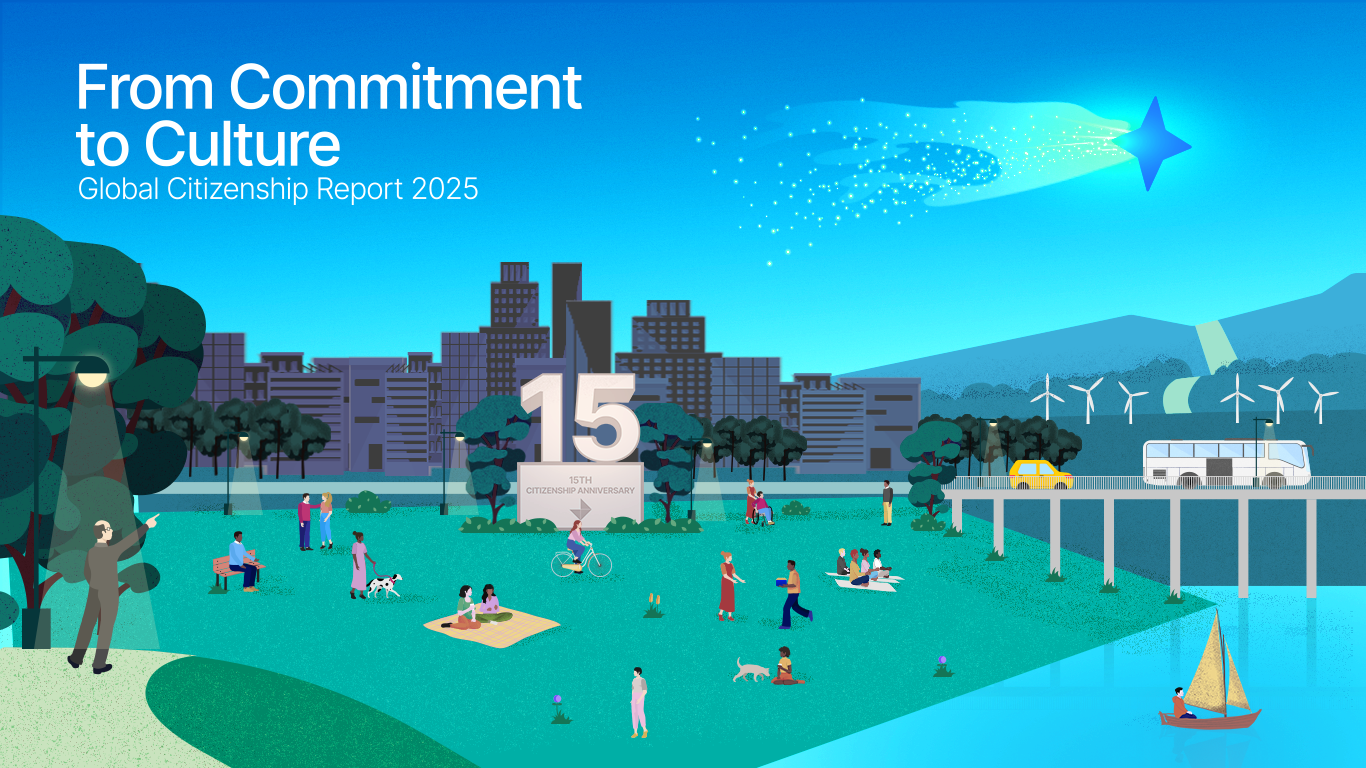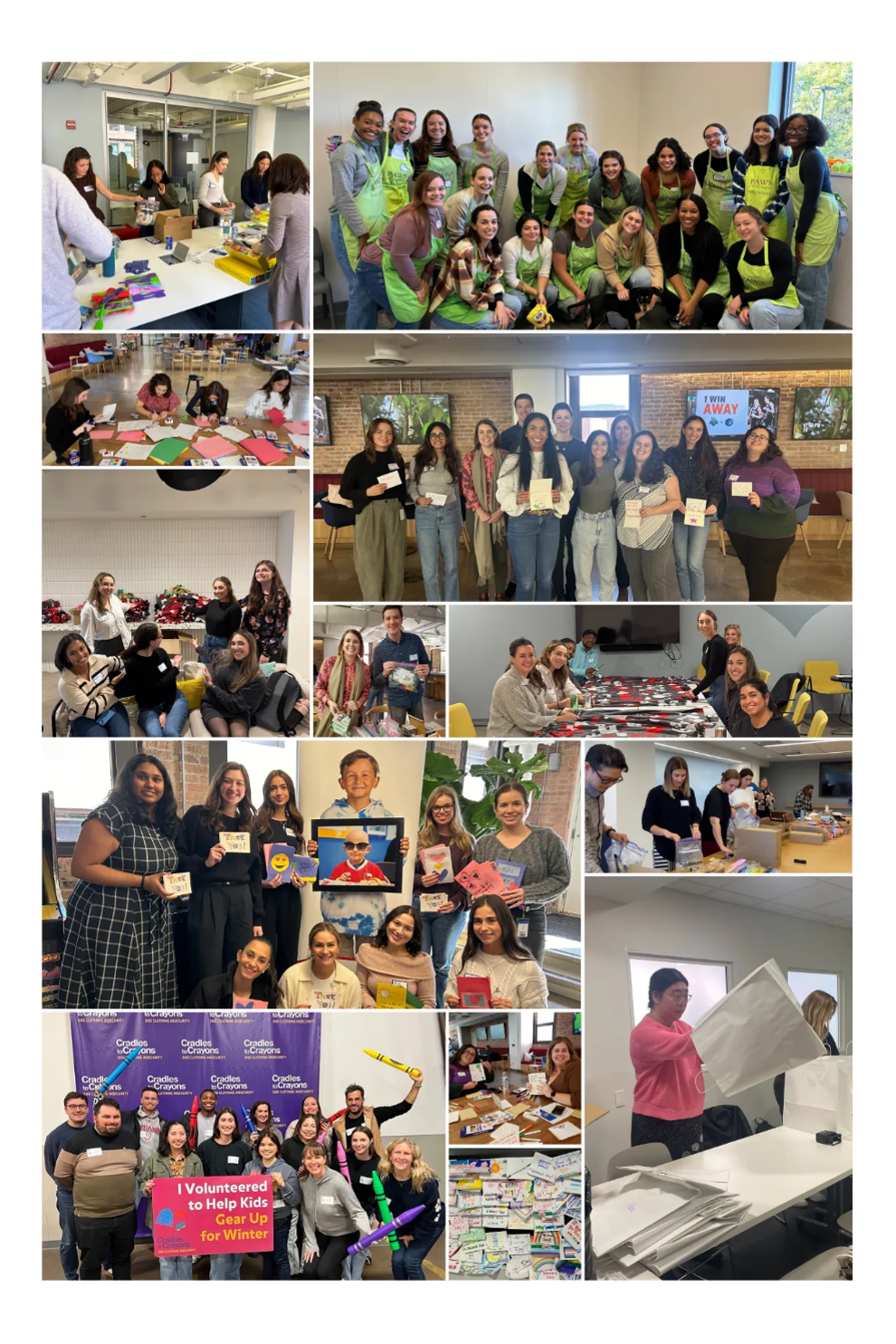
Citizenship at
Edelman
Since 2010, Citizenship has evolved from commitment into a defining part of how we work, shaping how we support our people, serve clients, and contribute to communities. As the world changes, so does our approach, but our focus on impact remains the same.
Meaningful change takes time, focus and transparency. We continue to be anchored in Dan Edelman’s founding principles, integrity, inclusion, and action, which shape our commitments to belonging, climate responsibility, and the trust we build every day.

A Letter from Richard Edelman
Purpose in Action: Celebrating 15 Years of Citizenship and 25 Years of Trust
As we reflect on this year’s milestones – the 25th anniversary of our Trust Barometer and the 15th anniversary of our Citizenship program – we recognize how the meaning of purpose has evolved.
People don’t want to be told what to care about. They want to see how it affects their lives, including how business decisions improve their world. And the language has evolved with them. Sustainability and diversity remain vital but, increasingly, these aspirations have shifted from abstract ideals to such tangible outcomes as clean air, safe water, and equitable opportunity that matter personally.
At Edelman, purpose is not a slogan – it’s a strategy. Since our founding in 1952 by Dan Edelman, citizenship has been embedded in our culture. Dan believed trust was essential to success, and that without it, credibility and reputation erode. These anniversaries reflect his legacy and underscore our belief that purpose, when authentically lived, drives transformative change.
This year’s sustainability report highlights how we’re turning purpose into progress – both through our client work and our internal commitments. Consider these illustrations:
Operational Sustainability: We’ve set ambitious goals to minimize our environmental footprint. This includes partnering with suppliers who share our environmental objectives.
People and Culture: Within Edelman, we continue to believe that sustainability and diversity build trust, and trust is the foundation of our relationships with employees, clients, and communities. Living our values consistently is how we earn and maintain that trust.
Client Impact: We partnered with eBay to position the platform as a leader in sustainable fashion. During Fashion Week, eBay launched an “endless runway,” allowing shoppers to purchase curated and pre-owned pieces from top designers timed with their new collections. This initiative helped consumers see eBay as a stylish, eco-conscious, and affordable alternative to fast fashion—aligning sustainability with personal style and value.
This report reflects our long-standing commitment to responsible business practices and our belief that purpose must be personal, measurable, and enduring. As we look ahead, we remain focused on creating opportunity, protecting the environment, and building trust—one action at a time.
“Edelman has been a participant in the United Nations Global Compact since March 2001. I am proud to pledge Edelman’s continued support for the Global Compact and its goals.”
Richard Edelman is CEO.
A Conversation with John Edelman
Our Citizenship Journey
John Edelman, managing director of Global Citizenship and Corporate Responsibility, spearheaded and continues to lead our 15-year-old global citizenship program. In this conversation, John shares his insights into what it requires to maintain a vital and forward-thinking program that focuses on sustainability, societal, and governance stewardship.
What sparked establishment of our Citizenship function?
John: My father and our founder Dan Edelman was a visionary in terms of citizenship and corporate responsibility. Many of the concepts in his highly regarded 10 Principles for Success align strongly with what we do in citizenship around pro bono and skills-based volunteerism, health and well-being, workplace inclusion, education and training, and managing our carbon footprint. Our formal program denotes that global citizenship is an operating philosophy – a view of the world and our role in it that influences and transforms the work we do every day and how we do it.
What role does Citizenship play at Edelman?
John: Increasingly, we consider Citizenship in every operational decision we make, and we strive to embed sustainability in all aspects of what we do. Citizenship and sustainability have become transformational forces as we seek to hold ourselves accountable every step of the way and live out our fourth core value: the commitment to positively impact society. From volunteerism and pro bono work, inclusivity and belonging to greener offices and responsible procurement, citizenship at Edelman continues to kindle a collective force for good.
What are the principal objectives of our global program?
John: There are three. The first one involves implementing citizenship and sustainability into all aspects of Edelman by embedding them into our overall corporate strategy and getting senior leadership alignment. To be truly effective, they must be embedded in all we do, and we’re making strong progress in achieving it.
Number two is using sustainability to innovate and, through innovation, enhance our reputation. We’re working to develop more strategic and inventive ways to be sustainable, which also helps reduce costs. The third goal is to better engage our employees, the communities where we live and work, and our suppliers with our sustainability efforts. Effective supplier engagement is critical because we cannot achieve our emission targets if we don’t get our suppliers onboard.
One of our early learnings was that what gets measured gets managed. That led us a decade ago to introduce our Citizenship (or C) score, which is a simple concept with a meaningful impact. It measures our sustainability performance and enables offices and their employees to compare their performance with other offices and track progress. Ultimately, it leads to uniformity in our offices, and that’s good.
Describe the program’s 15-year path.
John: In the first 10 years, progress was incremental as we built support and generated early successes. They include the grants we award annually to community groups recommended by our employees; our greenhouse gas reporting program; and societal elements that became especially relevant during COVID.
During the next five years, we integrated those and other elements into our culture as stakeholder expectations accelerated and as extreme weather events grew in number and intensity. Now, program advances are transformational, and we anticipate these transformations will be embedded in our strategies, policies, and programs.
We expect our climate transition plan to be the roadmap for achieving our climate goals. For example, our new supplier environmental policy sets sustainability expectations for the first time for our business partners and suppliers as our clients have set expectations for us. We also expect to make further progress in meeting our GHG emission goals by setting enforceable travel policies that help reduce emissions.
What are you most proud of?
John: I’m most gratified with how vital our citizenship program is to Edelman and the progress we’ve made. For instance, we now meet quarterly with senior leaders on the operations committee to recommend sustainability solutions to be budgeted and incorporated into ongoing business strategy. Also, sustainability has become the lens we use when viewing our shared services functions. So we’ve budgeted funds for all offices to conduct waste audits to meet our 50% waste diversion goal by 2028. And we focus on sustainability in deciding where to locate offices and what sustainable features they must include, such as gas and water meters and motion sensors to pare down energy costs. We will be leasing only electric vehicles by 2028 and, with extreme climate-related events increasing, we are adopting mitigation and adaptation strategies that counter such impacts as water shortages and extreme temperatures.
What’s on your wish list to achieve?
John: A major one we’re working on, as I’ve mentioned, is getting our suppliers on board to help us attain our emission-reduction goals. We’ll never reach our Science-Based Target without embedding sustainability criteria into our supplier chain to obtain the data we need from them. Second, we must be ready to meet the mounting environmental reporting requirements that are coming from states such as California and governmental bodies abroad as well as from clients. Third, and most important, while we are integrating sustainable practices within our organization, we must embed sustainability into all aspects of Edelman as part of our overall corporate strategy. That’s the last frontier.
What can we expect ahead?
John: A long-term goal is for our operational functions to integrate sustainability into their decision-making as our shared services functions do now. Once we embed sustainability into everything we do, we believe it will provide the foundation to evolve innovative solutions to further grow the company.
John Edelman is the Managing Director of Global Citizenship and Corporate Responsibility.

74% of employees say citizenship is an important factor in choosing to work at Edelman.

Created supplier environmental policy.
Drafted first Climate Transition Plan.

Nearly 70% employees volunteered in the past year through Edelman programs and personal efforts.

Celebrated the 25th Anniversary of the Edelman Trust Barometer.
Days of Service
Activate Around the World


69% of offices have a food waste program
87% of offices collect e-waste
71% of offices have energy-efficient lighting
75% of offices distributed green info to staff
84% of offices practice HVAC reduction
Our Volunteer Impact
Environmental Ratings
and Targets
Here’s how we’re taking action in sustainability and climate leadership, backed by recognized rating platforms and initiatives.
CDP
See https://www.cdp.net/en for Edelman’s CDP Climate Change questionnaire response.
Ecovadis
As part of our commitment to society, our people and the environment, Edelman reviews the sustainability practices of its supply chain partners through EcoVadis, the world’s most trusted provider of business sustainability ratings. The EcoVadis evaluation includes 21 sustainability criteria across four core themes: Environment, Labor & Human Rights, Ethics and Sustainable Procurement, and is used to assess and drive sustainability improvement across our supply chain.
Edelman has approved near-term, long-term, and net-zero science-based emissions reduction targets with the SBTi.
Near-Term Targets
- Reduce absolute Scope 1 and 2 GHG emissions by 80% by CY2030 from a CY2019 baseline year
- Reduce absolute Scope 3* GHG emissions by 55% by CY2030 from a CY2019 baseline year
Long-Term Targets (2040)
- Reduce absolute Scope 1 and 2 GHG emissions by 90% by CY2040 from a CY2019 baseline year
- Reduce absolute Scope 3* GHG emissions by 90% by CY2040 from a CY2019 baseline year
Net-Zero Target
- Reach net-zero emissions across the value chain by 2040 from a 2019 baseline year
*Scope 3 targets include emissions covering purchased goods and services, fuel and energy related activities, upstream transport and distribution and business travel
